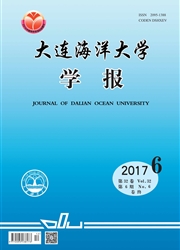

 中文摘要:
中文摘要:
对中国对虾Fenneropenaus chinensis“黄海2号”幼虾(平均体质量为2.54g)的适宜养殖盐度进行了探讨。试验设置5个盐度梯度(0、8、15、23、30),对不同盐度下幼虾的存活率及生长速度进行了比较分析。结果表明:盐度对中国对虾“黄海2号”的存活与生长影响显著,0盐度组中国对虾5d内全部死亡,其他盐度组对虾的存活率有一定差异,其中30盐度组对虾成活率最高(95%),8盐度组对虾成活率最低(81%);盐度对生长速度也有显著影响,23盐度组对虾生长最快,13增重达0.202g,其次是15、30盐度组,日增重分别为0.175、0.172g,而8盐度组对虾的生长速度最慢,日增重仅为0.152g。研究表明,中国对虾“黄海2号”不适合淡水养殖,但8以上的低盐条件下可以养殖,最佳养殖盐度为23左右。
 英文摘要:
英文摘要:
A 40 day feeding trial was conducted to determine effects of different salinities(0,8,15,23, and 30)on growth and survival of Chinese shrimp Fenneropenaeus chinensis strain "Huanghai No. 2" juveniles with body weight of 2.54 g. The results showed that the salinity had significant effects on the survival and growth in the shrimp. The shrimp was found to be survival for only 5 days when it was exposed to the water with a salinity of 0. There was dif- ferent survival in the shrimp exposed to various salinities, the maximal rate of 95% at a salinity of 30, and the min- imum of 81% under a salinity of 8. The best growth (daily weight gain of 0. 202 g) was observed in the shrimp ex- posed to a salinity of 23, followed by at a salinity of 15 (daily weight gain of 0. 175 g), and 30 (daily weight gain of 0. 172 g) , and the poorest growth (daily weight gain of 0. 152 g) at a salinity of 8, indicating that "Huanghai No. 2" is not suitable for being cultured in freshwater. The findings approve that "Huanghai No. 2" juveniles can be cultured at a salinity of over 8, the optimal of about 23.
 同期刊论文项目
同期刊论文项目
 同项目期刊论文
同项目期刊论文
 Quantitative analysis of temperature, salinity and pH on WSSV proliferation in Chinese shrimp Fenner
Quantitative analysis of temperature, salinity and pH on WSSV proliferation in Chinese shrimp Fenner 期刊信息
期刊信息
